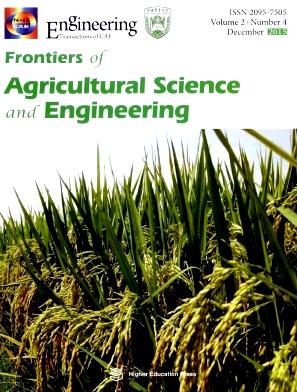粮食系统转型:概念、机制和实践
IF 2.8
4区 农林科学
Q1 AGRONOMY
引用次数: 0
摘要
全球粮食系统面临着重大且相互关联的复杂挑战,包括气候变化、极端天气事件、自然资源枯竭、生物多样性丧失、新出现的动植物疾病、冲突和贸易冲击。在2019冠状病毒病大流行期间,全球无法获得充足食物的人口数量急剧增加。据估计,到2021年,全球约有7.02亿至8.28亿人处于饥饿状态,仅因2019冠状病毒病(COVID-19)全球大流行的爆发,就增加了1.5亿人。如果不采取紧急行动,收入减少、食品价格上涨和供应链持续中断将导致全球粮食不安全状况更加严重和广泛,影响到几乎每个国家的弱势家庭。©作者2023。高等教育出版社出版。本文章由计算机程序翻译,如有差异,请以英文原文为准。
FOOD SYSTEMS TRANSFORMATION: CONCEPTS, MECHANISMS AND PRACTICES
The global food systems face significant interrelated and complex challenges, including climate change, extreme weather events, natural resource depletion, biodiversity loss, emerging plant and animal diseases, conflict and trade shocks. The number of global populations that lacked access to adequate food sharply increased during the COVID-19 pandemic. It is estimated that in 2021, about 702 million to 828 million people around the world suffer from hunger, with an increase of 150 million people alone due to the outbreak of the global COVID-19 pandemic[1]. Reduced incomes, food price inflations and continued supply chain disruptions will lead to even more severe and widespread increases in global food insecurity if urgent action is not taken, affecting vulnerable households in almost every country. © The Author(s) 2023. Published by Higher Education Press.
求助全文
通过发布文献求助,成功后即可免费获取论文全文。
去求助
来源期刊
CiteScore
5.10
自引率
2.70%
发文量
33
期刊介绍:
Frontiers of Agricultural Science and Engineering (FASE) is an international journal for research on agricultural science and engineering. The journal’s aim is to report advanced and innovative scientific proceedings in agricultural field including Crop Science, Agricultural Biotechnology, Horticulture, Plant Protection, Agricultural Engineering, Forestry Engineering, Agricultural Resources, Animal Husbandry and Veterinary Medicine, Applied Ecology, Forestry and Fisheries. FASE is committed to provide a high level scientific and professional forum for researchers worldwide to publish their original findings and to utilize these novel findings to benefit the society.

 求助内容:
求助内容: 应助结果提醒方式:
应助结果提醒方式:


